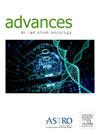Assessment of Approaches Promoting Virtual Radiation Oncology Educational Content to Medical Students
IF 2.7
Q3 ONCOLOGY
引用次数: 0
Abstract
Purpose
Virtual learning in radiation oncology (RO) has potential to reach medical students who otherwise lack access to RO exposure or mentorship at their school. This study characterized the relative effectiveness of different methods of promoting virtual education content, to inform future efforts to expand access to RO education.
Methods and Materials
A 4-part “Oncology Virtual Series for Medical Students” was developed to emulate an oncology interest group (OIG). All academic RO department chairs and residency program directors were asked to engage their respective Dean's office or OIG to promote to all students, especially groups with primarily underrepresented in medicine membership. Promotional emails were also sent to the Diversity, Equity, and Inclusion office of all allopathic United States (US) medical schools, and Student National Medical Association (SNMA) and Latino Medical Student Association (LMSA) regional directors. The American Society for Radiation Oncology (ASTRO) promoted via ASTROgram, social media, and ROhub. Descriptive statistics are reported.
Results
A total of 660 students preregistered, and 140 attended, at least 1 session. Attendees represented 53 allopathic and 2 osteopathic US medical schools, and 18 international schools. One hundred six attendees (87%) were from schools with an affiliated RO department, and 79 (65%) with an affiliated RO residency. Fifteen schools had at least 3 students attend, with the highest number of attendees from the principal investigator's home institution (n = 10). These 15 schools accounted for 52% of all attendees, of which 10 had an affiliated RO residency. Two hundred eighty of six hundred sixty preregistered students (42%) described how they heard about the series: 87 (31%) medical school faculty, 75 (27%) social media post or email, 53 (19%) OIG, 16 (6%) SNMA or LMSA, and 15 (5%) ASTRO.
Conclusions
Disproportionately high attendance was from a few schools, suggesting that radiation oncologists’ individual efforts and pre-existing relationships with students, Dean's offices, and student groups are most effective for promoting nationwide virtual RO education.
促进医学生虚拟放射肿瘤学教育内容的方法评估
目的:放射肿瘤学(RO)的虚拟学习有可能惠及那些在学校无法接触到RO或获得指导的医科学生。本研究描述了不同推广虚拟教育内容方法的相对有效性,为未来扩大虚拟教育的可及性提供信息。方法和材料开发了一个由4部分组成的“医学生肿瘤学虚拟系列”,以模拟肿瘤学兴趣小组(OIG)。所有学术RO系主任和住院医师项目主任都被要求与各自的院长办公室或OIG合作,向所有学生推广,特别是在医学会员中代表性不足的群体。还向美国所有对抗医学院的多样性、公平和包容办公室以及全国学生医学协会(SNMA)和拉丁裔医学学生协会(LMSA)区域主任发送了宣传电子邮件。美国放射肿瘤学会(ASTRO)通过ASTROgram、社交媒体和ROhub进行宣传。报告了描述性统计数据。结果共660名学生预注册,140名学生参加了至少一次会议。与会者代表53所对抗疗法和2所整骨疗法美国医学院,以及18所国际学校。106名参加者(87%)来自附属RO系的学校,79名(65%)来自附属RO住院医师。15所学校至少有3名学生参加,其中来自主要研究者所在机构的人数最多(n = 10)。这15所学校占所有参与者的52%,其中10所学校有附属的RO驻地。在660名预先注册的学生中,有280名(42%)描述了他们是如何听说这个系列的:87名(31%)医学院教师,75名(27%)社交媒体帖子或电子邮件,53名(19%)OIG, 16名(6%)SNMA或LMSA, 15名(5%)ASTRO。结论:少数学校的出勤率过高,表明放射肿瘤学家的个人努力以及与学生、院长办公室和学生团体的预先关系对于促进全国虚拟RO教育是最有效的。
本文章由计算机程序翻译,如有差异,请以英文原文为准。
求助全文
约1分钟内获得全文
求助全文
来源期刊

Advances in Radiation Oncology
Medicine-Radiology, Nuclear Medicine and Imaging
CiteScore
4.60
自引率
4.30%
发文量
208
审稿时长
98 days
期刊介绍:
The purpose of Advances is to provide information for clinicians who use radiation therapy by publishing: Clinical trial reports and reanalyses. Basic science original reports. Manuscripts examining health services research, comparative and cost effectiveness research, and systematic reviews. Case reports documenting unusual problems and solutions. High quality multi and single institutional series, as well as other novel retrospective hypothesis generating series. Timely critical reviews on important topics in radiation oncology, such as side effects. Articles reporting the natural history of disease and patterns of failure, particularly as they relate to treatment volume delineation. Articles on safety and quality in radiation therapy. Essays on clinical experience. Articles on practice transformation in radiation oncology, in particular: Aspects of health policy that may impact the future practice of radiation oncology. How information technology, such as data analytics and systems innovations, will change radiation oncology practice. Articles on imaging as they relate to radiation therapy treatment.
 求助内容:
求助内容: 应助结果提醒方式:
应助结果提醒方式:


